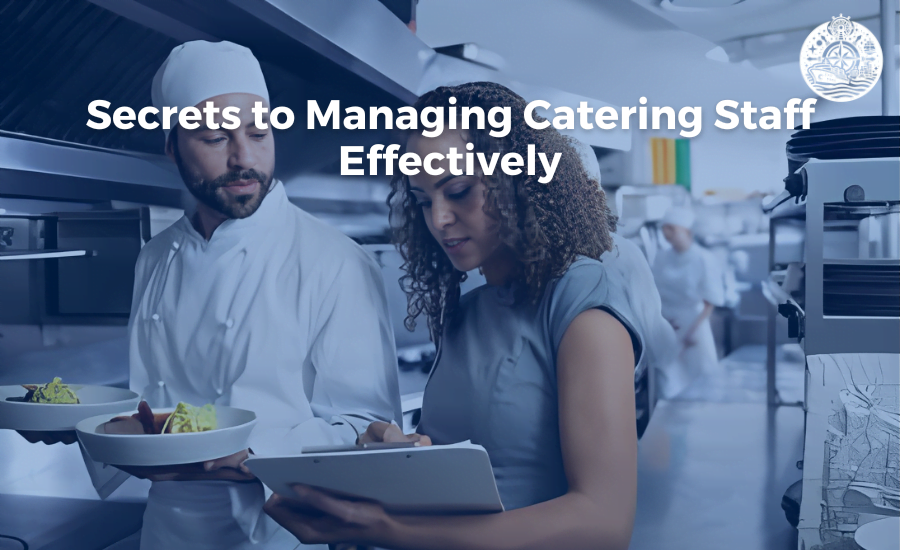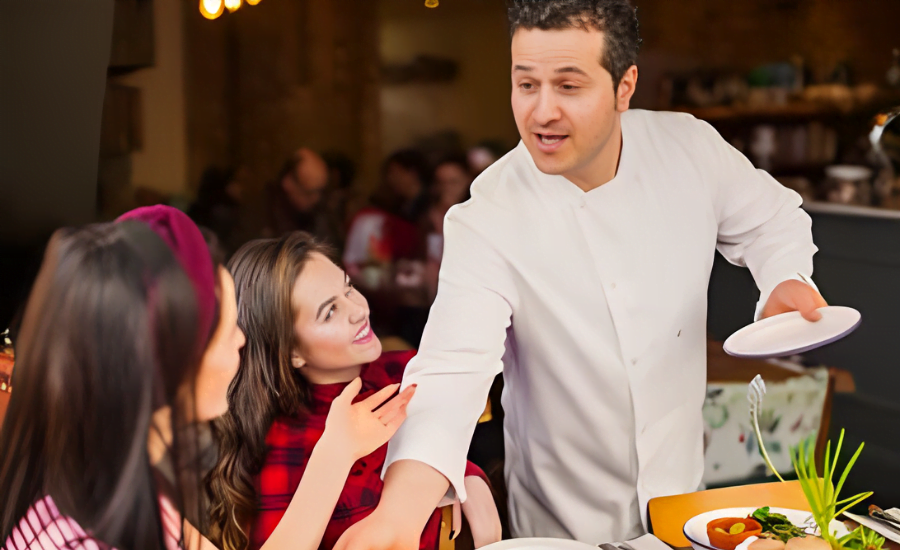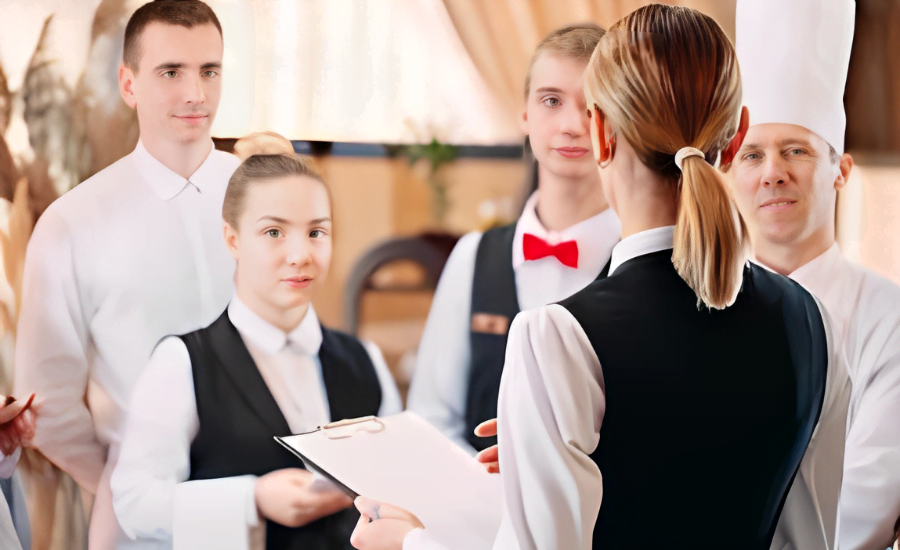
No matter how great the event’s theme or how great the entertainment, food and drink are usually the focus of large events. Sure, you may have the best menu, but if you don’t have the right staff to serve and display it, you could end up losing out on a lot of repeat business and new prospects. Yet somehow, catering staff are often overlooked in effective event management and overall event success. In this post, you’ll learn ten essential tips for managing catering staff at events of all sizes.
First things first. Knowing whether you can trust your catering staff is an important factor when planning and executing your event. All employees being considered for a position at a catering company must be thoroughly vetted, as most will be in front-line contact with guests. Like other elements of the hospitality industry, guest experience is the backbone of the restaurant industry. Here are ten keys to managing catering staff at large events.
Prioritise Training
Catering staff may have little experience, and even those with some experience will require training. Needless to say, one of the greatest characteristics of a successful company is its ability to adapt and integrate new technology into the workplace. Some of these technologies may require individual or group training. In addition to training on new technology, it’s always a good idea for employees to brush up on the basics. Providing proper training throughout employment creates a solid foundation and gives employees room to grow.
Know Your Employees
Getting to know her employees will make you seem like a more approachable manager. It also helps you identify each employee’s strengths and weaknesses to put them in positions that will help both you and your employees succeed. It might be a good idea to hold a team-building event outside of daily work. Off-site events can be a little overwhelming for you and your employees. But if you enjoy it, maybe even just once a month, you can get a huge return on your investment in employee cohesion, team loyalty, and overall workplace confidence.
Prepare a Rush Strategy.
Anyone who has worked in the hospitality industry knows the moment when many people flock to a bar for food or for their first drink or drink. A rush can occur at any time from the time all participants arrive until the DJ and speakers take a break.
As part of your rush strategy, you should plan to add staff and reduce staff as your event winds down. This way, your costs won’t go up, and your staff won’t be sedentary during off-peak hours. After all, big events can last hours, if not days.
Improving the Customer Service Experience

Customer service plays a huge role in managing the staff at any event. It improves the overall quality of the product that the customer receives. In fact, according to the Huffington Post, 86% of consumers are willing to pay more for an improved experience. This is a big number and an even huge opportunity for caterers and event planners to increase their revenue. There is no single element that makes customer service perfect.
In its broadest sense, this is a combination of active listening and effective HR processes. Ways to continually improve customer service include gathering feedback from guests, taking advantage of learning opportunities, anticipating guest needs, and paying close attention to detail. Remember, a great customer experience doesn’t happen overnight. So, continue to implement effective practices in all areas of your business.
Lead by Example
As a catering manager or event planner, you are in charge, and your direct reports follow your work. You need to model the behaviour you want from your employees. This means being on time and leaving last. We’re all human, so it’s easy to arrive in a bad mood before an event. But remember that your mood affects other people, too. When your employees’ energy is low, your customers’ moods may also be low. Please do your best to move forward. Your company and employees will follow you.
Reward Early and Often
It’s simple: When you prize your employees, they reward you. Turn large events into contests to reward specific employees who serve the most people or receive great feedback from event guests. Rewards and incentives are a great way to motivate your team to give 100% effort during an event.
Have a Comprehensive Backup Plan
When it comes to catering events, always plan for the worst and hope for the best. Anything from broken glass to bad weather can happen. There is usually plenty of time to plan ahead. Provide additional food quantities, additional cutlery, backup staff, serving plans for inclement weather, pre-planned event schedules, and menus tailored to guest preferences. Big events can feel overwhelming, but if you don’t plan ahead, mistakes can happen.
Use Best-in-Class Planning Tools.
Large events typically require large catering staff and large events can be held at multiple venues over extended periods of time. If you’re still using pen and paper or a simple Excel® spreadsheet to schedule your employees, this can be a pain to handle. Employees may get sick, have an emergency, or encounter unexpected traffic jams on the day they are scheduled to work. How can you prepare for these incidents using simple technology? With today’s technology, employee scheduling software automates all manual scheduling processes, reducing human Eliminate all errors caused by mistakes. This ensures you have the right number of employees, always have up-to-date information, and can easily access it at any time. Finding the right software can save you thousands and minimise a lot of stress down the road.
Effective Communication
When large events involve many employees, communication is key to keeping your business running smoothly. You want to emphasise not only strong communication between you and your employees but also strong communication between your employees’ team members. It’s very easy for things to get out of control and employees to start running around like chickens with their heads cut off.
When employees communicate effectively, they acquire all the knowledge and skills they need to perform their jobs effectively. Successful communication skills can be tailored to all types of industries, from the emails you send each other before an event to coordinating your big day. The trick is to implement all the best practices.
Create a Positive Work Environment

A hostile work environment will never work. Just because you’re a manager doesn’t mean your catering staff’s leadership skills are 100% perfect. Be consistent in your leadership style by reading frequently, creating an open feedback loop with your team, and conducting informative reviews to support your team members and help them grow. Planning events and running a catering business is hard work, but it can also be fun. It’s okay to joke around with colleagues and customers to help them open up to you. A successful work environment requires a healthy balance between fun and work.
What are the Roles and Responsibilities of a Manager?
The job of a catering manager is to prepare and serve delicious food to attendees at your event. Their responsibilities include sourcing ingredients, organizing staff, designing menus, and creating beautiful dining experiences.










